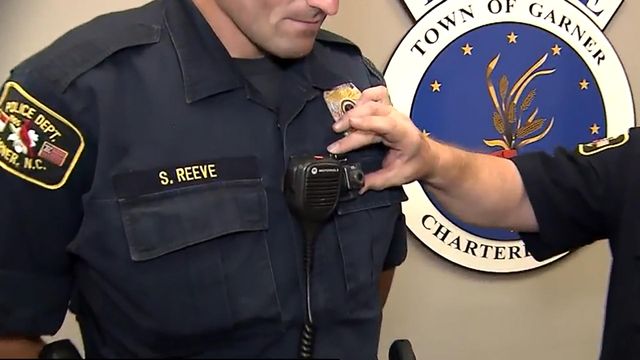As law enforcement nationwide faces scrutiny, cameras protect both public and officers
After Michael Brown was fatally shot by a police officer in Ferguson, Missouri, police departments across the country rushed to purchase body cameras for their officers in an effort to quench the public's outcry for more transparency in policing. Five years later, departments in the Triangle who have them say the cameras protect both officers and members of the public.
Posted — UpdatedFive years later, 95 percent of large law enforcement agencies across the country have them.
WRAL News reached out to 11 agencies in central North Carolina to talk about body cameras. Some didn't want to talk, others still don't have body cameras, but the command staff at the agencies willing to speak say the cameras are an indispensable tool for policing in today's world.
The cameras offer transparency and protect both members of the public and officers because video doesn’t lie, officers said.
The Garner Police Department started using body cameras two years ago after receiving more than $100,000 in state and federal grants.
Every sworn officer in the department is issued a body-worn camera, Capt. Lorie Smith said.
The department has 69 such cameras, which are integrated with cameras in police cars. One camera activates the other.
“I can either manually activate this camera, and it will activate an in-car camera, or if the in-car camera is activated, it automatically activates this one,” Smith said.
Smith said the department started researching cameras in 2015 – not as a direct reaction to officer-involved shootings like the one in Ferguson, but in response to a national trend for law enforcement agencies to be more transparent and hold officers accountable.
The cameras also hold the members of the public accountable.
Cameras give Smith a feeling of security, “security and confidence in knowing that my interactions with the public are going to be captured,” she said.
At the same time, many other officers seen on the video were cleared.
Chief Laura Fahnestock of the Fuquay-Varina Police Department said in an email that it was difficult to determine a correlation between the fatal shooting in Ferguson with the department's changing technology and evolving community outreach because it hasn't had significant use-of-force incidents.
While body cameras are able to quickly clear officers in false complaints, cameras in police cars used before body cameras were also able to do that, she said.
In February, the Cary Town Council approved $1.2 million to implement the police department's first body-camera program.
There are 120 car cameras and will soon be 165 body cameras, Capt. Steve Wilkins said.
Cary has had dash cameras for 15 years, but they are now upgrading the equipment so they can be integrated with the body cameras.
When an officer's lights and sirens are turned on, the cameras are activated.
“We know that our officers know they are being held accountable to whatever is on that video,” Wilkins said.
Wilkins said it wasn’t national or local headlines about officer-involved shootings that prompted them to purchase the body cameras.
“We’ve not had those terrible things that have happened that forced us into doing this,” Wilkins said. “We did this because it’s the right thing to do.”
Beyond helping investigations into cases and complaints, Wilkins said the cameras keep everyone on their toes.
“When a camera is on scene, sometimes it changes behavior,” Wilkins said. “People always behave better when they know others are looking.”
Chances are, more people will be looking at more police camera videos in the future as the public demands a higher level of scrutiny of law enforcement.
“We don’t always get it right, but we do our best to get it right every single time,” Wilkins said. “We want people to see that we work really hard to get it right.”
Not every police department has body cameras or cameras in their cars, like Apex, Clayton and Smithfield police.
The biggest obstacle for most departments is finding the money to purchase, install and maintain the cameras and the video, which is stored 90 days or longer depending on the case.
The technology can cost hundreds of thousands of dollars. Agencies either have to apply for government grants or appeal to their municipalities for taxpayer dollars.
Officers who spoke to WRAL News said it’s not a matter of if but when all departments will ultimately be outfitted with body cameras.
“We hope that it helps enhance the trust that we have between the police department and the community,” Smith said.
• Credits
Copyright 2024 by Capitol Broadcasting Company. All rights reserved. This material may not be published, broadcast, rewritten or redistributed.






